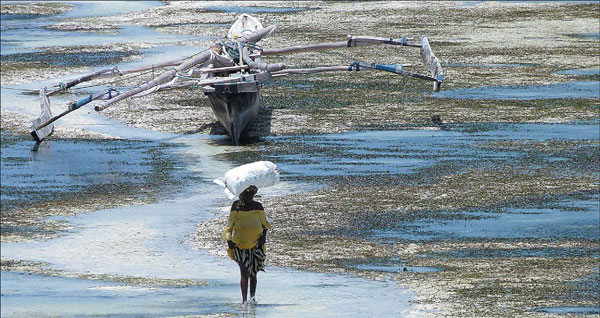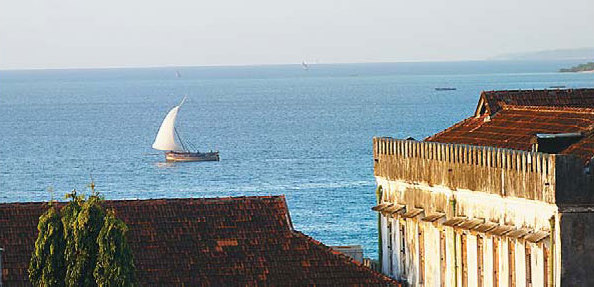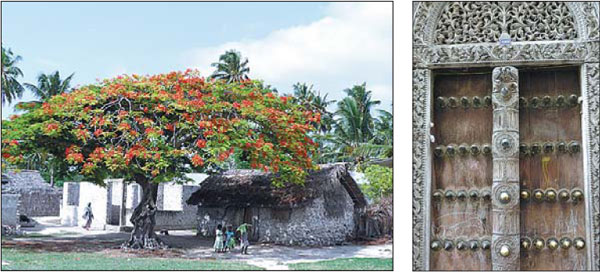Interlude in Zanzibar
Updated: 2013-05-05 07:38
By Steve Hubrecht (China Daily)
|
||||||||
|
Zanzibar boasts some of the most stunning beaches in the world with aquamarine waters lap over the white coral sand. Photos by Steve Hubrecht / for China Daily |
|
As the sun dips toward the Indian Ocean, it is a perfect time to retire to the balconies and terraces of the many old merchant mansions in Stone Town that have been repurposed into guesthouses. |
|
Left: Traditional whitewashed coral limestone buildings loom over the streets in the Stone Town; right: Stone Town is rich with Swahili architecture. |
This storied island's distinctive Swahili culture blends African, Arab, Persian, Indian and colonial European influences. Steve Hubrecht savors the exotic culture - and awesome beaches - that beckon today.
The exceptionally narrow lanes of Stone Town, the old part of Zanzibar's principal town, wind in all directions. It is impossible not to get lost, but it is also impossible not to enjoy getting lost. Traditional whitewashed coral limestone buildings loom over the maze-like warren of streets. Swahili women wrapped in beautifully patterned, vibrantly colored kanga clothes float down the alleys. Troops of children dressed in white march to Quranic classes in small madrassas. Old men sit on cement baraza benches, sipping nutmeg and cinnamon-laced tea, playing bao (a traditional game) or dominoes.
As the sun dips toward the Indian Ocean the Muslim call to prayer (muezzin) echoes across the town, a perfect time to retire to the balconies and terraces of the many old merchant mansions in Stone Town that have been repurposed into guesthouses.
Zanzibar - the name alone is enough to elicit exotic daydreams. The reality does its best to match and, in many cases, surpasses those dreams.
The islands (Zanzibar is technically an archipelago, rather than a single island) off the coast of Tanzania boast some of the most stunning beaches in the world: Aquamarine waters lap postcard-perfect white coral sand, fringed by coconut palms and cooled by breezes that carry the scent of the islands' many spice plantations.
Zanzibar has long been a meeting point and melting pot of African, Asian and European empires. The islands' distinctive Swahili culture is a heady blend of mainland African, Arab, Persian, Indian and colonial European influences.
The sultans of Oman controlled Zanzibar from the 1600s to the late 1800s and during this time the islands became the most economically important part of Africa, principally on the back of the horrific slave trade and the lucrative spice trade. The slave trade decreased when abolitionist Britain made Zanzibar a protectorate, but growing spices remained (and still remains) big business.
These days a spice tour is a must-do for visitors to Zanzibar. Local guides take you into the islands' lush, green interior, giving you a thorough firsthand look at how cloves, nutmeg, cinnamon, cardamom, vanilla, lemongrass, mint, pepper vines, turmeric and countless other spices and fruits are cultivated.
Tourists also have the chance to gain insight into Zanzibar's past, with self-guided or guided visits to well-interpreted monuments, old slave market sites and a chilling former slave dungeon. The dank, claustrophobic underground cells are sobering, many still left with the desperate scratch marks made by former inhabitants.
Zanzibar gained independence from Britain, merged with Tanganyika in 1964 to form the United Republic of Tanzania and has seen the number of foreign visitors explode since the early 1990s, to the point that tourism has replaced spices as the islands' main industry.
The overwhelming majority of tourists in Zanzibar come from Europe, but in February 2011 Tanzania rolled out a new 'think Asia' tourism promotion blitz, targeting potential visitors from both emerging and established Asian economies.
"We are generously throwing our gates open for Indians, Chinese and Japanese tourists," Aloyce Nzuki, managing director of the Tanzania Tourist Board told eTurboNews when the promotion began.
With plenty of attractions both natural and cultural as well as opportunity for both blissfully passive beach lounging and more active snorkelling, hikes in monkey-filled national parks or shopping in the old town, there certainly is a little of something for everybody in Zanzibar.
It's an ideal place to kick back for a few days, or even a few weeks, after taking in mainland Tanzania's more famous attractions.
The rigors of 4 am safari drives in the Serengeti or climbing Kilimanjaro leave many travelers feeling the need for a bit of a vacation from their vacation. Zanzibar is the perfect tonic.
While all the beaches on Zanzibar's main island (Unguja) are gorgeous, most cater to different crowds. Those on the northwest appeal to younger, budget-oriented backpackers looking for a party.
The upscale resorts on the northeast coast target luxury tourists. And the boutique guesthouses on the southeast coast are a hit with those looking for a quiet, mid-range retreat.
Jambiani village in the southwest is home to a locally run ecotourism organization that offers a cultural village tour, on which you can visit a local school, watch seaweed farming and make your own coconut-husk fiber ropes.
Snorkeling and scuba diving off Zanzibar are world-class, with multitudes of vibrant fish swimming just under the turquoise ocean surface.
If you prefer to stay above the waves, you can catch a ride on a traditional dhow.
Tourists can also hike through Jozani Forest National Park, where many are rewarded with red colobus monkey spottings. On the aptly named Turtle Island (also called Prison Island), off the west side of Unguja, you can visit a group of giant tortoises.
Visitors would be wise to spend a few days in Stone Town as well as time on the beach.
Stone Town is great for aimlessly wandering, admiring the exquisite Swahili architecture (particularly the carved Zanzibari doors), perusing the many shops or following in the footsteps of legendary explorers such as David Livingstone and Henry Morton Stanley.
No visit to Zanzibar is complete without sampling the delicious local cuisine.
Fantastic coconut-based Swahili curries, usually seafood-based, are great fare at both local beach shacks and some of the boutique guesthouses and are washed down perfectly with a cup of spicy Swahili tea.
But the best place to sample local snacks is in the night market, which gets going every evening just after dark. Rows of local vendors proffer whatever the fishermen have caught that afternoon - fried, roasted, spiced and prepared the Zanzibari way.
Contact the writer at sundayed@chinadaily.com.cn.

 'Taken 2' grabs movie box office crown
'Taken 2' grabs movie box office crown
 Rihanna's 'Diamonds' tops UK pop chart
Rihanna's 'Diamonds' tops UK pop chart
 Fans get look at vintage Rolling Stones
Fans get look at vintage Rolling Stones
 Celebrities attend Power of Women event
Celebrities attend Power of Women event
 Ang Lee breaks 'every rule' to make unlikely new Life of Pi film
Ang Lee breaks 'every rule' to make unlikely new Life of Pi film
 Rihanna almost thrown out of nightclub
Rihanna almost thrown out of nightclub
 'Dark Knight' wins weekend box office
'Dark Knight' wins weekend box office
 'Total Recall' stars gather in Beverly Hills
'Total Recall' stars gather in Beverly Hills
Most Viewed
Editor's Picks

|

|

|

|

|

|
Today's Top News
Shenzhou X astronaut gives lecture today
US told to reassess duties on Chinese paper
Chinese seek greater share of satellite market
Russia rejects Obama's nuke cut proposal
US immigration bill sees Senate breakthrough
Brazilian cities revoke fare hikes
Moody's warns on China's local govt debt
Air quality in major cities drops in May
US Weekly

|

|










